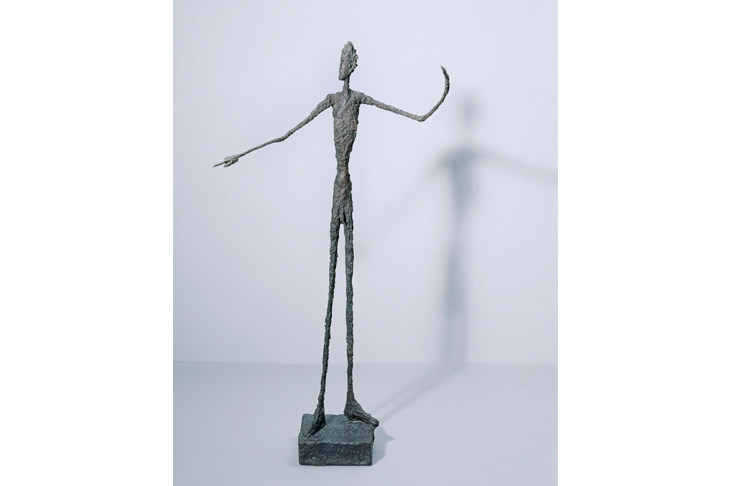Size, of course, matters a great deal in art; so does scale — which is a different matter. The art of Alberto Giacometti (1901–66) illustrates the distinction. There are very few major artists who have produced objects so physically minuscule. But the smaller and thinner his people are, the vaster the space they seem to inhabit. That’s where scale comes in.
There was a period of about five years, wrote his friend the critic David Sylvester, ‘when every figure Giacometti made (with one exception) ended up an inch high more or less.’ You encounter just such a work about halfway around Tate Modern’s big new Giacometti exhibition. Aptly entitled ‘Very Small Figurine’ (1937–9), it’s tiny: a naked woman as thin as a needle and perhaps a centimetre high. To see her at all it is necessary to peer through the glass of the case. Then she appears, like a person seen from a great distance surrounded by an enormous expanse of nothingness.
That’s the Giacometti effect. Not all his sculptures are so diminutive, otherwise Tate Modern would not have needed its grandest suite of galleries for this retrospective. But, famously, he returned to France after the war years — which he had spent in Geneva, working in a hotel room — with his entire output from the previous four years stored in six matchboxes.
After that, Giacometti’s figures and busts grew larger — in certain dimensions. Some became extraordinarily tall, while remaining immensely thin. ‘Standing Woman I’ (1960) looms above you like an idol, almost three metres tall. But there is very little to her except inordinate height. And what there is looks insubstantial: instead of being defined by firm contours — like a Rodin, say — there is a sort of flicker around her edges as if she were dissolving into the atmosphere.
The later sculptures are often like that. The marvellous ‘Dog’ (1951) is scarcely even the shadow of a hound, its legs no more than wisps. But how full of vitality it seems, almost visibly padding along, nose to the ground. If Giacometti’s beings extend in one dimension, they shrink in another.
The profile of ‘Tall Thin Head’ (1954) — a bust of the artist’s brother Diego — is quite expansive, but from the front the face is as thin as a broom handle. That is how Giacometti saw living creatures: fragile, and engulfed in vastness. This was the opposite of a Greek or Renaissance muscleman, heroic and strong. Giacometti once pointed out that human life is possible only within narrow limits. A small shift in temperature or atmospheric pressure and we begin to suffer, a slightly bigger one and we’re dead.
His three-dimensional art isn’t concerned with mass and solidity and most of the usual sculptural preoccupations. That’s equally true of his paintings — less interesting as far as I’m concerned — which convey little sense of volume or weight. They consist of a skein of lines, mapping a body in space, almost monochrome and occasionally sunk in sepulchral gloom. ‘Sometimes, in a café,’ Giacometti wrote, ‘I watch the people going by on the opposite pavement and I see them very small, like tiny statuettes which I find marvellous.’ If the person came nearer, he was unable to see her properly; she almost ceased to exist.
Only in the second half of his life, from the late 1930s, did his idiosyncratic vision of the world become the main theme in his art. Previously he had gone through a surrealist phase; indeed, he was the best surrealist sculptor (admittedly, this was not a very competitive field).
At this stage, Giacometti’s recurrent theme seems to be frustration. ‘Suspended Ball’ (1930–1), for instance, consists of a sphere dangling from a string, almost — but not quite — touching a sharply angled wedge resembling a slice of melon. Such works were perhaps metaphors for his sexual difficulties — Giacometti suffered from impotence — but then so, in another way, were his later ones.
His post-war work was plagued by a different sense of impossibility. Transmitting how he perceived a sitter seemed unattainably hard. That was why Giacometti tackled the same subject again and again. Dealers were advised to physically remove works from him, otherwise he would have carried on making and remaking them for ever.
All in all, he is an awkward candidate for blockbuster treatment: undeniably great but highly repetitive (and, in Britain, overfamiliar). I must confess that when this exhibition was announced — the second big Giacometti show in London in under two years — my pulse did not race.
However, the team at Tate Modern has pulled it off: varying the pace, sometimes grouping works together, spacing them out elegantly elsewhere. You are only occasionally aware of what a glut of standing women, busts of Diego and walking men Giacometti produced (most of the sculptural output of his last two decades falls into those three categories). It is hard to imagine a better overview of this strange but compelling artist: it’s beautifully done.






Comments